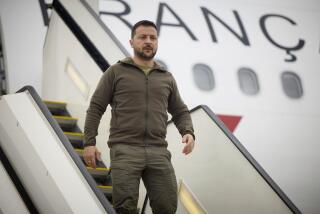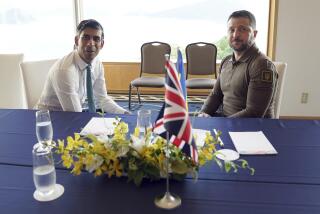Leaders Move to Cement Improvement in Relations
- Share via
GOVERNORS ISLAND, N.Y. — President Reagan and Soviet President Mikhail S. Gorbachev held their fifth and final meeting here Wednesday in an atmosphere of extraordinary cordiality and hope, lauding each other for the progress they have made toward warmer U.S.-Soviet relations and urging President-elect George Bush to continue in their path.
In more than two hours of meetings on Governors Island, a Coast Guard base in New York Harbor, the two presidents and the president-to-be discussed a range of issues, from Gorbachev’s surprise announcement of unilateral troop cuts to nuclear weapons, human rights and even horseback riding.
They came to no new agreements, issued no joint statement and set no date for a first summit for the incoming Bush Administration. Instead, officials on both sides said, what was important about this informal summit was a less tangible process of cementing the general improvement in relations and ensuring that it continues smoothly after Bush’s inauguration Jan. 20.
Gorbachev’s visit to New York, which was to have ended Friday, was cut short hours after the meeting with Reagan when Soviet Foreign Minister Eduard A. Shevardnadze announced that Gorbachev will fly home before noon today because of a major earthquake in the southwestern Soviet Union.
Reagan and Bush expressed their sympathies to Gorbachev during the summit, but none of the three then knew the seriousness of the quake.
After the summit, Reagan told reporters that the main theme was continuity. “We agreed to continue the process we made under the new Administration,” he said.
Gorbachev was even more ebullient. “I think we are now at the threshold, present at the birth, of a new phase in our relations--a phase that promises many good things for both our nations,” he told reporters after bidding Reagan farewell.
Bush, whose status as the official who will take office as President on Jan. 20 was a major reason for the impromptu summit, was more reserved. Asked by reporters for his feelings on the meeting, he replied only: “Give me a ring on the 21st.”
Reagan added a cautionary note to the summit Wednesday night after his return to Washington in a speech before an audience of conservative supporters. The United States, he said, “must remain strong and free of illusion” because that is the only way the nation can “reach out and embrace this new era and transform this hope of peace and freedom for all the world into reality.”
It was at the lunch with Gorbachev in the elegant dining room of the 19th-Century Admiral’s quarters on the island, however, that Reagan sounded the theme of the day. He offered what his spokesman called an “informal and spontaneous” toast: “To what we have accomplished--what we together have accomplished--and what you and the vice president, after Jan. 20, will accomplish together.”
Said Gorbachev later, “It was a very open meeting in a very good atmosphere. We shared the view that what we have been able to begin over these years should be continued. This is very important. So I think our two peoples can look forward to good prospects.”
U.S. and Soviet officials who were present at the lunch said that while the discussion touched on the points of conflict between the two nations, it was more often cordial--and, at times, even lighthearted.
“It wasn’t in any remote sense a negotiating session or anything of that kind, but in many ways better than a negotiating session,” Secretary of State George P. Shultz said.
“There were serious subjects talked about, but also many jokes,” Soviet Foreign Ministry spokesman Gennady I. Gerasimov said.
White House spokesman Marlin Fitzwater agreed, saying, “They told a lot of stories.” Asked about specific issues that White House officials had said were on the U.S. agenda, Fitzwater replied: “It was more philosophical, forward-looking.”
“Lunch was a very delightful and productive discussion,” Fitzwater said, much like an “evening-at-home dinner”--complete with toasts among the two Presidents and the President-elect.
Neither spokesman volunteered any of the jokes or stories the leaders had swapped. But Shultz described the lunch as a mixture “of substantive and cordial informal talk about such a variety of things as the politics of change, the difficulties with bureaucracies, the health-giving properties of horses, as the President somehow got onto that subject.”
“I think the general secretary (Gorbachev) brought it up,” Shultz added.
Other issues on the table included Gorbachev’s program of economic and political reform, known as perestroika , human rights in the Soviet Union and the unrest between ethnic Armenians and Azerbaijanis in the country’s southern republics.
“There was a fairly lengthy period of discussion about chemical weapons and the importance of concluding a protocol or treaty in Geneva to ban them,” Shultz said. Bush has long urged more attention to the control of chemical weapons, and Shultz said the President-elect was “very active” in that exchange.
Fitzwater said that 30% of the luncheon discussion was devoted to the chemical weapons issue. He said Gorbachev agreed with Reagan’s comments and noted that Bush had expressed a “longstanding interest” in banning the weapons.
Briefing reporters on the way back to Washington, Fitzwater said that at the beginning of the luncheon, Reagan led a discussion on southern Africa, thanking Gorbachev for Soviet help in negotiating independence for Namibia and the removal of foreign troops from Angola.
For his part, Gorbachev said he did not want the United States to be suspicious of the Soviet Union and that he wanted to work cooperatively with the new Administration. “The name of the game today is continuity,” Fitzwater quoted the Soviet leader as saying.
Reagan, Bush and Gorbachev also touched on several arms control issues, according to Shultz, but gave “very little” attention to Gorbachev’s announcement of cuts in Soviet troops and tanks. Reagan praised Gorbachev’s announcement as “a positive and constructive speech,” Shultz said, but he did not discuss the fine points of the issue--in part because he had not heard the speech or seen its text.
“That’s no basis for having any intensive discussion beyond asking him, ‘Well, what does he have in mind?’ ” Shultz said. “He has in mind trying to restructure things so that they’re more clearly defensive in nature. So we are interested in that comment, and we’ll study this carefully.”
But this was a summit at which body language was as important as specific proposals--and there was plenty of body language to watch:
Gorbachev striding confidently up to the entrance of the Admiral’s quarters only an hour after making his announcement at the United Nations; Reagan smoothly taking the Soviet leader’s arm to show him the best views of the Statue of Liberty and lower Manhattan; both presidents laughing easily at each other’s jokes; Bush, deliberately deferential, standing slightly off to the side during photographs and sitting in a rear-facing jump seat in the presidential limousine.
Although his ascendance to the White House was a central reality underlying the meeting, Bush stayed out of the limelight, making no statements. But when he told reporters to “give me a ring on the 21st,” Gorbachev--perhaps looking toward their future relationship--immediately praised the quip as “one of the best answers of the year.”
Bush has long said he does not want a summit of his own until after consultations with Congress and European allies on new arms control positions, and he stuck to that Wednesday.
“There’s no immediate plan for any meeting . . . although obviously there will be one at some appropriate moment,” Shultz said. “No doubt there’ll be a foreign ministers’ meeting or two before that. . . . But the underlying intent is to see things develop in a positive way insofar as it’s possible, and it certainly is quite possible.”
Soviet spokesman Gerasimov said Gorbachev understood Bush’s position. “We favor continuing (summit meetings),” he said. “But . . . Vice President Bush has to organize a new Administration.”
Instead of dwelling on the future, the meeting’s focus was a celebration of the distance the U.S.-Soviet relationship has come since 1985, when Reagan first met with Gorbachev, in Geneva, after a six-year-long freeze.
The tide has changed so strongly, Shultz noted, that some are even debating whether the Cold War that has defined superpower relations since World War II might be over.
“The words ‘Cold War’ mean one thing to you, another thing to me, another thing to somebody else,” Shultz said.
“I think the important point is that there has been a very powerful change in the nature of the relationship between the U.S. and the Soviet Union. . . . You can see it in the things that have been settled in arms control; you can see it in . . . the ability we have to collaborate effectively, for example, in what we’re doing in southern Africa. You can see it in an altogether different manner of discussion of the area of human rights. . . .
“So I don’t know whether you want to say that’s the end of the Cold War or not. But it’s different--a lot different--and, for my tastes, a lot better.”
The presence of history--the sense of formally marking a long turning point in U.S.-Soviet relations, and of the transition in authority from Reagan to Bush--was explicit.
Just before they parted, an official said, Reagan presented Gorbachev with a photograph from the first of their five meetings, the late-autumn summit in Geneva only three years ago.
The photograph showed Reagan and Gorbachev walking alone toward their celebrated one-on-one talk on the chilly shores of Lake Geneva.
The inscription, over Reagan’s signature, reads: “To President Mikhail Gorbachev: We’ve walked a long way to prepare a path for peace.”
More to Read
Sign up for Essential California
The most important California stories and recommendations in your inbox every morning.
You may occasionally receive promotional content from the Los Angeles Times.














